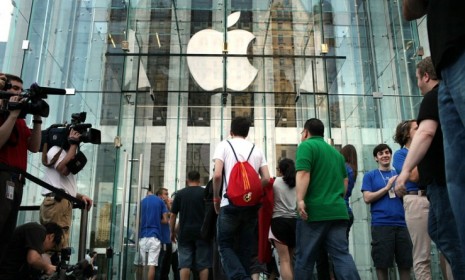How the iPhone 5 could juice the U.S. economy
The feverishly anticipated new smartphone will likely fly off shelves by the millions, acting as a veritable stimulus program. In your face, Fed?

The iPhone 5, which is expected to be unveiled Wednesday and go on sale later this month, "could get credit for something Congress, the White House, and the Federal Reserve have struggled to do," says Sudeep Reddy at The Wall Street Journal: "Boost the U.S. economy in a measurable way." In a report titled "Can one little phone impact GDP?" financial analysts at JPMorgan Chase predict that sales of Apple's new phone could be so large that they'll significantly lift the entire U.S. economy. Here, a guide to the little phone that could:
How would the iPhone boost the economy?
The analysts estimate that each iPhone will sell for $600. (Of course, consumers often pay less than this, but in such cases, the rest of Apple's $600 price tag is simply subsidized by wireless carriers, stores, and other parties.) From that $600, the analysts subtract $200 for imported components (which are technically considered a drag on the economy), so that each sale is worth $400 to the U.S. economy. If Apple manages to sell 8 million phones by the end of 2012, it will contribute $3.2 billion to the economy, increasing fourth-quarter gross domestic product by one-third of a percentage point. JPMorgan estimates that the impact could even reach one-half of a percentage point.
The Week
Escape your echo chamber. Get the facts behind the news, plus analysis from multiple perspectives.

Sign up for The Week's Free Newsletters
From our morning news briefing to a weekly Good News Newsletter, get the best of The Week delivered directly to your inbox.
From our morning news briefing to a weekly Good News Newsletter, get the best of The Week delivered directly to your inbox.
Is that a big deal?
Yes. GDP in the second quarter grew at a paltry rate of 1.7 percent, so a 0.5 percent bump would make a huge difference. The bottom line? "What's good for Apple is good for the United States," says Derek Thompson at The Atlantic.
Is there reason for skepticism?
Yes. JPMorgan acknowledges that the figure is "eye-popping," says Steve Schaefer at Forbes, and on that basis alone should be taken with a grain of salt. In addition, the report "doesn't take into account forgone sales of alternative phones — that is, sales of other cell phones that would surely happen if the iPhone 5 weren't on the market," says Dino Grandoni at The Huffington Post. "Those foregone sales should be subtracted from the GDP boost." Still, there's no denying the iPhone 5 will likely provide some economic stimulus to a beleaguered economy.
A free daily email with the biggest news stories of the day – and the best features from TheWeek.com
And that's a good thing?
Sure — if you have no other alternative. "You know what would also be nice?" says Paul Krugman at The New York Times. If the GDP grew because of "useful stuff like infrastructure," which would employ "labor and cash that would otherwise sit idle."
Sources: The Atlantic, The Commerce Department, Forbes, The Huffington Post, The New York Times, The Wall Street Journal, The Washington Post

